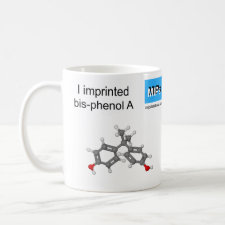
Authors: Zhang JH, Jiang M, Zou LJ, Shi D, Mei SR, Zhu YX, Shi Y, Dai K, Lu B
Article Title: Selective solid-phase extraction of bisphenol A using molecularly imprinted polymers and its application to biological and environmental samples.
Publication date: 2006
Journal: Analytical and Bioanalytical Chemistry
Volume: 385
Issue: (4)
Page numbers: 780-786.
DOI: 10.1007/s00216-006-0406-5
Abstract: Molecularly imprinted polymers (MIPs) were prepared using bisphenol A (BPA) as a template by precipitation polymerization. The polymer that had the highest binding selectivity and ability was used as solid-phase extraction (SPE) sorbents for direct extraction of BPA from different biological and environmental samples (human serum, pig urine, tap water and shrimp). The extraction protocol was optimized and the optimum conditions were as follows: conditioning with 5 mL methanol-acetic acid (3:1), 5 mL methanol, 5 mL acetonitrile and 5 mL water, respectively, loading with 5 mL aqueous samples, washing with 1 mL acetonitrile, and eluting with 3 mL methanol. MIPs can selectively recognize, effectively trap and preconcentrate BPA over a concentration range of 2-20 mu M. Recoveries ranged from 94.03 to 105.3 %, with a relative standard deviation lower than 7.9 %. Under the optimal condition, molecularly imprinted SPE recoveries of spiked human serum, pig urine, tap water and shrimp were 65.80, 82.32, 76.00 and 75.97 %, respectively, when aqueous samples were applied directly. Compared with C18 SPE, a better baseline, better high-performance liquid chromatography separation efficiency and higher recoveries were achieved after molecularly imprinted SPE
Template and target information: bisphenol A, BPA
Author keywords: Molecularly imprinted polymers, Solid-phase extraction, bisphenol A, biological and environmental samples



Join the Society for Molecular Imprinting

New items RSS feed
Sign-up for e-mail updates:
Choose between receiving an occasional newsletter or more frequent e-mail alerts.
Click here to go to the sign-up page.
Is your name elemental or peptidic? Enter your name and find out by clicking either of the buttons below!
Other products you may like:
 MIPdatabase
MIPdatabase









